#nikolai is so *incoherent‚ demonic screeching*
Text
He’s 26.
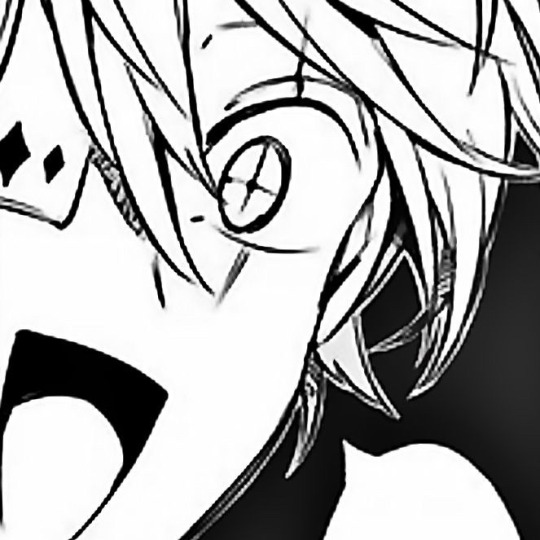
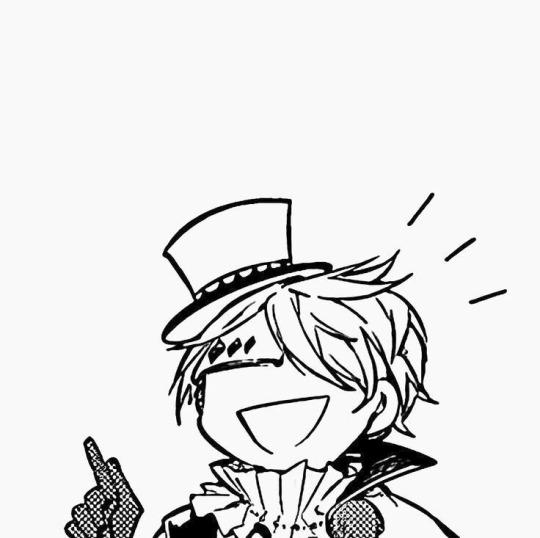
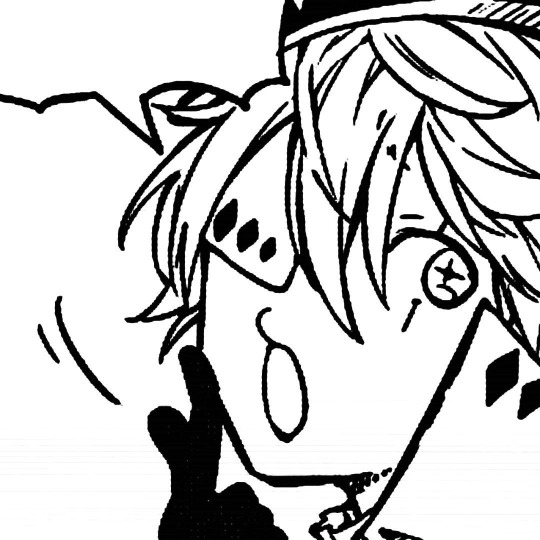
#a child#that’s all I’m gonna say about this#nikolai is so *incoherent‚ demonic screeching*#so what if I want to stuff him into my pocket?#bungou stray dogs#bsd#tea time#🕊️
216 notes
·
View notes
Note
Did you say dadbod!nikolai? (*incoherent, demonic screeching*) him being a bit more soft but still visibly muscular underneath, aahhhh god his hugs would be perfect, flawless, and he can toss and move you around however he likes, and literally hold both your wrists in one of his hands with ease, oh my goodness I need him so bad. Dad!nikolai, host!nikolai, any version of him as long as he’s balls deep in my—
hio i need you take a DEEP ASS BREATH HDJFJGFJD
oh he would be muscular underneath like he HAS MUSCLES YOU GUYS JUST DONT SEE IT YET and im sure he would give massive daddy vibes HAHA HA HA HA mmmm getting manhandled by nikolai doesn't sound bad at all
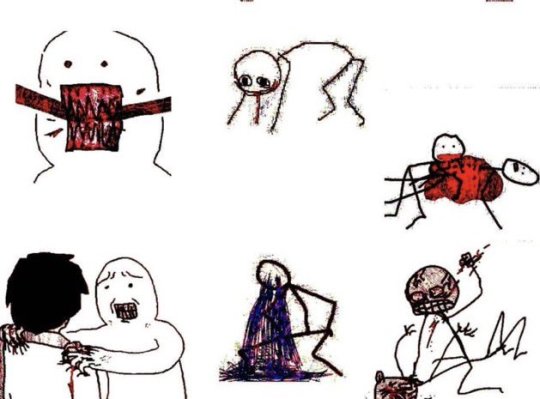

#ngl... i see nikolai in every white haired character ever existed and if we JUST focus JUST A BIT#fukuzawa could be old nikolai juat saying 😋#道化師-says❃ུ۪
29 notes
·
View notes
Text
Pain, Fear, Death, and God: Fyodor and Gogol as Two Halves of Kirillov
God is the pain of the fear of death. Whoever conquers pain and fear will himself become God.
-Alexei Kirillov, Demons
So remember how when I first read Bungou Stray Dogs I started screeching incoherently and turned those screeches into a somewhat-coherent meta on how Fyodor in BSD was modeled after Alexei Kirillov from Dostoyesvky’s Demons?
Well, here’s the follow up.

As I said in my previous meta, Demons is (tied with Crime and Punishment) my favorite novel of all time, and Alexei Kirillov is my very favorite character of all time, in any fictional medium, ever. He’s a walking bundle of paradoxes, existential angst and stunning compassion. But Demons is not necessarily a popular novel by Dostoyevsky standards and so Kirillov, despite being written about by literary critics and Camus, is somewhat obscure. That Asagiri is so clearly inspired by his character is shocking and thrilling for me; I’m pinching myself.
The tl;dr version of Kirillov is that his whole schtick is that he wants to kill himself to prove that he is free and thereby can escape. It’s far more nuanced and complex, as I’ll go into, but essentially both Gogol and Fyodor’s philosophies and goals reflect this.
Gogol does not want to kill Fyodor because he hates Fyodor; rather, it’s because Gogol and Fyodor are two halves of a whole. They are a paradox together, embodying Kirillov’s complexity. Like Kirillov, they are suicidal, because killing one of them is like killing themselves. To achieve their goals, they both need to die.
Fyodor reminds Gogol that he is human and can connect; therefore, Gogol wants to kill him to assert his free will, as he views connections as a cage. Similarly, while we haven’t gotten much insight into Fyodor’s thoughts on Gogol, I think it’s highly likely Fyodor allowed Gogol to kill himself (he thought) because he clings to his beliefs at the expense of his (very much there) empathy, and it’s better for his goals if people who provoke his empathy die. Basically: Fyodor allowed Gogol to “die” not because he doesn’t care about him, but because he does.
For a brief background: Demons itself is an allegory about how people who become consumed by their ideas become possessed by said ideas; thus, they become devils or demons. The actual title of the novel, Бесы, is difficult to translate, hence why it has three different titles in English: The Possessed, The Devils, and Demons. The word “Бесы” in Russian refers to the ones doing the possessing, which is why the latter two are generally considered to be more accurate translations of the title. In particular, the novel demonstrates the tragic consequences of Russian nihilism and singles out moral nihilism. (It’s also looked to as a rather eerie novel, because almost everything it wrote about happening in a--then fictional--political revolution is exactly what happened in Russia a few decades later.)
As I wrote in my previous meta, Fyodor, like Kirillov, is “consumed” by his ideas, something Kirillov laments in Demons. Fyodor’s consumption with his ideals means that he is willing to sacrifice everything for his goals. Gogol, too, shares this trait.
Where they differ is in motivations for their respective plans, motives they share with Kirillov. Kirillov’s master plan is to commit suicide for two reasons: firstly, that he has free will and will thereby inspire society to live freely, and secondly, because he sees life as nonsensically painful and thereby not worth living. The first reflects Gogol’s personal aims, and the second Fyodor’s.
Let’s discuss Kirillov and Fyodor first. Kirillov believes that mankind invented God (keep in mind the context this was written in; God=Russian Orthodox Christianity) to go on living because of the absurdity of life.
Listen: this man was the highest on all the earth, he constituted what it was to live for. Without this man the whole planet with everything on it is--madness only. There has not been one like Him before or since, not ever, even to the point of miracle. This is the miracle, that there has not been and never will be such a one. And if so, if the laws of nature did not pity even This One, did not pity even their own miracle, but made Him, too, live amidst a lie and die for a lie, then the whole planet is a lie, and stands upon a lie and a stupid mockery. Then the very laws of the planet are a lie and a devil's vaudeville. Why live then, answer me, if you're a man.”
Fyodor's disgust for the world and determination to save it from the sin of abilities reflects this same attitude. Life is wrong, so it should cease to exist. Abilities are wrong, so everyone with one should cease to exist. The reason is, most likely, strongly based in how painful Fyodor’s ability has been for him.
Kirillov laments:
“God is necessary and so must exist… But I know He doesn’t and can’t… Surely you must understand that a man with two such ideas can’t go on living?”
...
“If there is no God, then I am God.”
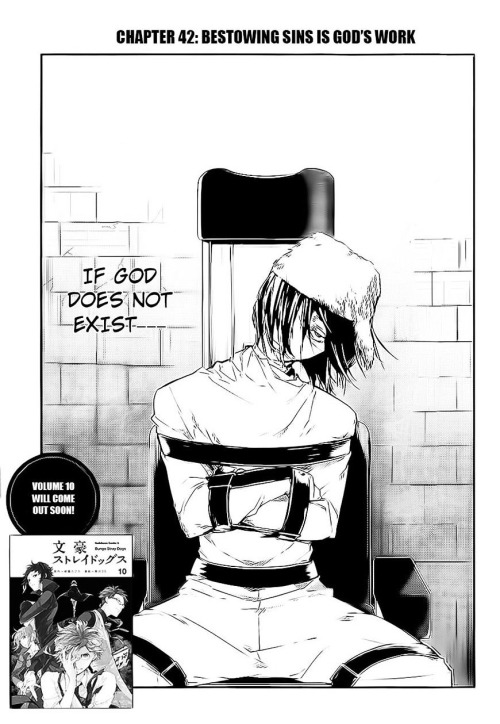
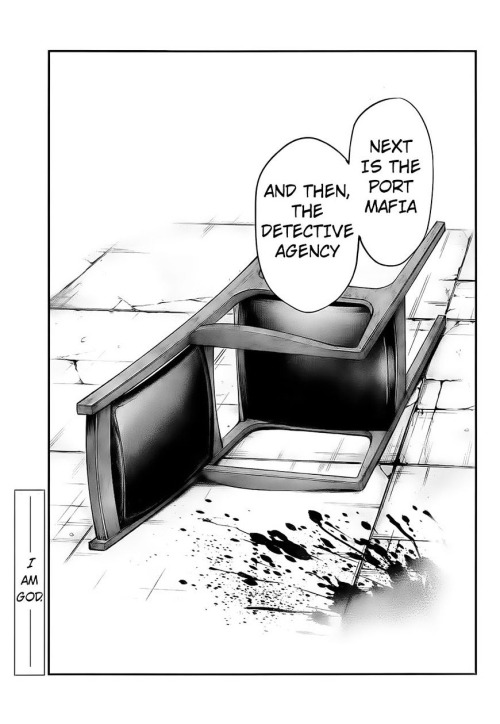
If Kirillov is god, then he is the ultimate master of his fate. Kirillov is very aware of his own limits, and so he thinks this absurd and life pointless.
That conversation continues (Kirillov’s responses are bolded):
“There, I could never understand that point of yours: why are you God?”
“If God exists, all is His will and from His will I cannot escape. If not, it’s all my will and I am bound to show self-will.”
“Self-will? But why are you bound?”
“Because all will has become mine. Can it be that no one in the whole planet, after making an end of God and believing in his own will, will dare to express his self-will on the most vital point? It’s like a beggar inheriting a fortune and being afraid of it and not daring to approach the bag of gold, thinking himself too weak to own it. I want to manifest my self-will. I may be the only one, but I’ll do it.”
This very much reflects Gogol: killing his high moral power (connection and empathy) through the man who identifies himself as a god (Fyodor) to prove his independence and freedom.
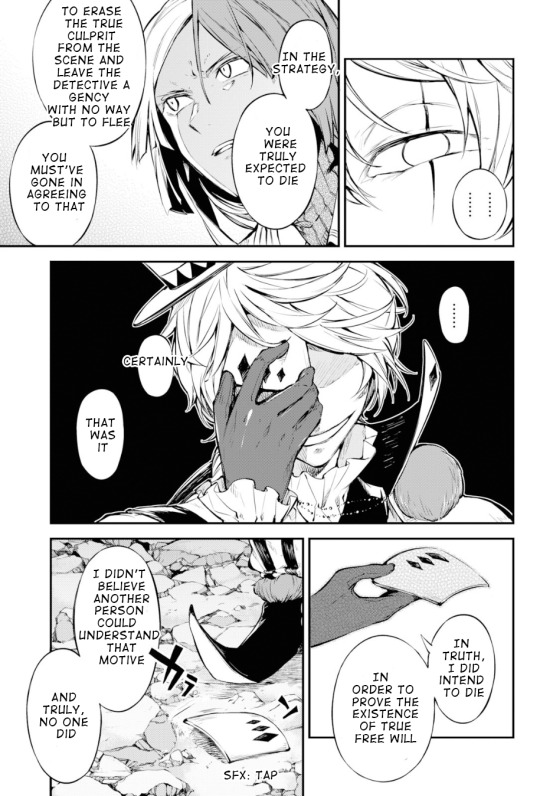

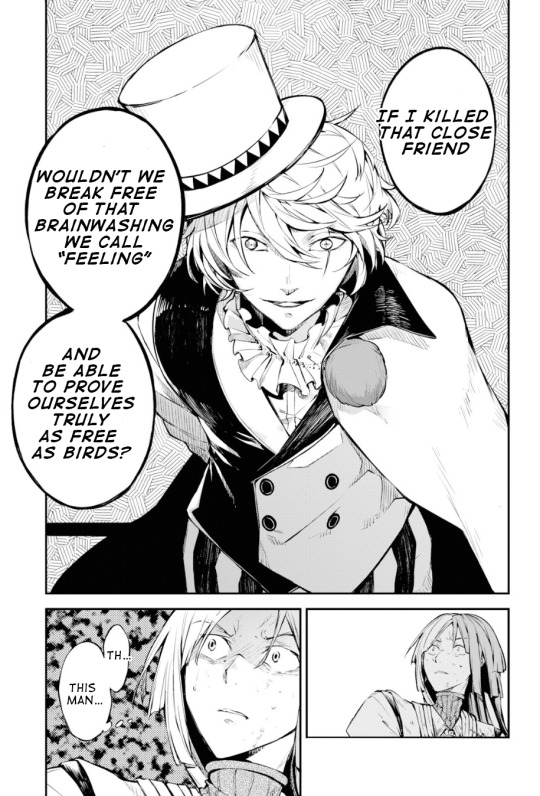
But we’ve kind of already seen where this ends:

Gogol you’ve literally shown yourself terrified of dying (which Kirillov is as well). I know Gogol was likely acting in this scene, but given the themes of BSD and Gogol’s character, plus the fact that he did, in fact, choose not to die, I think this is likely somewhat reflective of his true feelings.
But again, Kirillov asserts:
“I am awfully unhappy, for I’m awfully afraid. Terror is the curse of man.… But I will assert my will, I am bound to believe that I don’t believe. I will begin and will make an end of it and open the door, and will save. That’s the only thing that will save mankind and will re-create the next generation physically; for with his present physical nature man can’t get on without his former God, I believe. For three years I’ve been seeking for the attribute of my godhead and I’ve found it; the attribute of my godhead is self-will! That’s all I can do to prove in the highest point my independence and my new terrible freedom. For it is very terrible. I am killing myself to prove my independence and my new terrible freedom.”
As Gogol outlined, what disrupted his plans was Fyodor’s empathy for him, and his empathy for Fyodor. Their connection literally saved his life (hence I kind of doubt their connection will kill them in the end). He cannot die without killing that connection.
Two things almost disrupt Kirillov’s plans. Firstly, and chiefly, it’s his empathy for others. Kirillov is noted to be a character who is extremely kind, good with children, and unafraid to risk himself to help others. When Kirillov finds out his friend betrayed him and is planning to use Kirillov’s suicide to get away with the murder of a third friend, Kirillov is horrified. He refuses to go through with his suicide at first, screaming in horror that his friend is dead and that he unwittingly enabled his killer to end his life. When he does ultimately go through with it, he states that it is because “I want to kill myself now: all are scoundrels.” He goes through with it because his human connections are failing.
Even the novel’s most villainous character concludes “I agree” when Kirillov is called “good.” Kirillov will stop at nothing to help his friends, and he believes all people are good and will become good if they are just told they are. However, the tragic irony of this scene is that the person speaking to Kirillov--Nikolai Stavrogin--is very much a literary example of a psychopath. (Those of you who follow me know I don’t use that word lightly.) However, Stavrogin does not want to be this way; he wants to feel, he wants to be bothered by the terrible sins he’s committed. What he’s asking Kirillov, essentially, is to understand this and call him wrong for what he did, which absolutely no one does in the novel:
“Everything’s good.”
“Everything?”
“Everything. Man is unhappy because he doesn’t know he’s happy. It’s only that. That’s all, that’s all! If anyone finds out he’ll become happy at once...
“And if anyone dies of hunger, and if anyone insults and outrages the little girl, is that good?”
“Yes! ...They’re bad because they don’t know they’re good. When they find out, they won’t outrage a little girl. They’ll find out that they’re good and they’ll all become good, every one of them.”
“Here you’ve found it out, so have you become good then?”
“I am good.”
“That I agree with, though,” Stavrogin muttered, frowning.
“He who teaches that all are good will end the world.”
“He who taught it was crucified.”
“He will come, and his name will be the man-god.”
“The god-man?”
“The man-god. That’s the difference.”
Stavrogin’s examples are based on things he’s done. Kirillov isn’t aware of these deeds, but he does know his friend’s mind better than most of their other friends. The problem is that Kirillov refuses to truly act on this empathy, to accept that men can be scoundrels and good, because he wants what he believes (that all are good) to be so. Kirillov’s too consumed with his desire to end the world (hello Fyodor) to save mankind via proving himself free to actually use his empathy to help his friends. In fact, the murderer points out to Kirillov that if he’d focused more on his friend, he might have been able to prevent the murder.
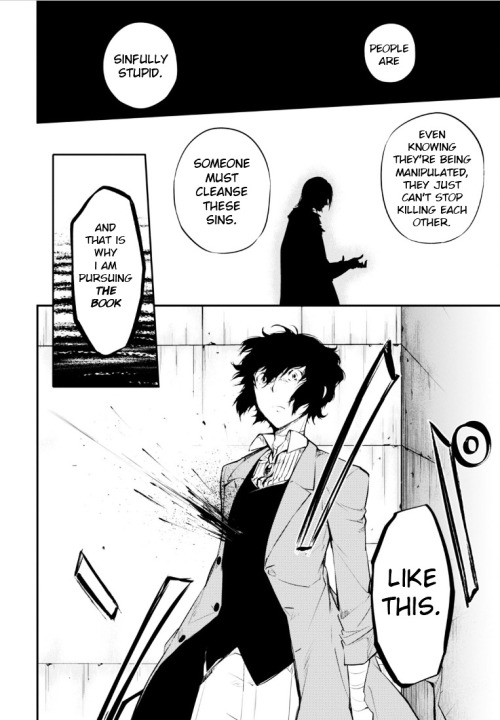
A similar attitude is reflected in Fyodor’s desire to destroy ability-users (i.e. end the world) and in his interactions with people. He doesn’t put his empathy into forming actual connections, and those he has he deliberately does not invest in (such as when he kills the kid in his introductory chapter). He kills ability users paradoxically because he cares about them and about other people. I wrote about it a bit in this meta here:
Fyodor... lives very much in a world of black and white. He makes Goncharov happy all the time, unable to experience pain or negative emotions. He believes all ability users are a sin and should be destroyed. He’s an idealist in a lot of ways, believing in absolutes (which is also a hallmark of a childish perspective...). he wants to... force every single ability user to feel his pain (that their abilities are a sin) by wiping them out. In short, Fyodor wants empathy despite refusing to listen to the feelings of others. (He understands their feelings; he just chooses to emphasize his pain over theirs.)
Unlike Kirillov, however, whose last scene is renowned as “the most harrowing in all of literature” (I can’t even describe it; it has to be read) I think there’s pretty good reason to hope that Fyodor and Gogol will not end up taking each other out. Because the thing about Kirillov, the reason his character resonates so much with me, is the second reason his plans are almost disrupted: it’s how desperately he wants to live. He just wants to know that his life matters. The way Kirillov expresses these desires is absurd in a lot of ways and certainly hyperbolic, but it’s a desire reflected in most of BSD’s characters, and in, well, a lot of us in real life, too.
Empathy and genuine human connection are the greatest powers in BSD’s world, as we saw recently through Atsushi getting the location of the page from empathizing with Sigma by telling him what he most wanted to know: that he mattered.
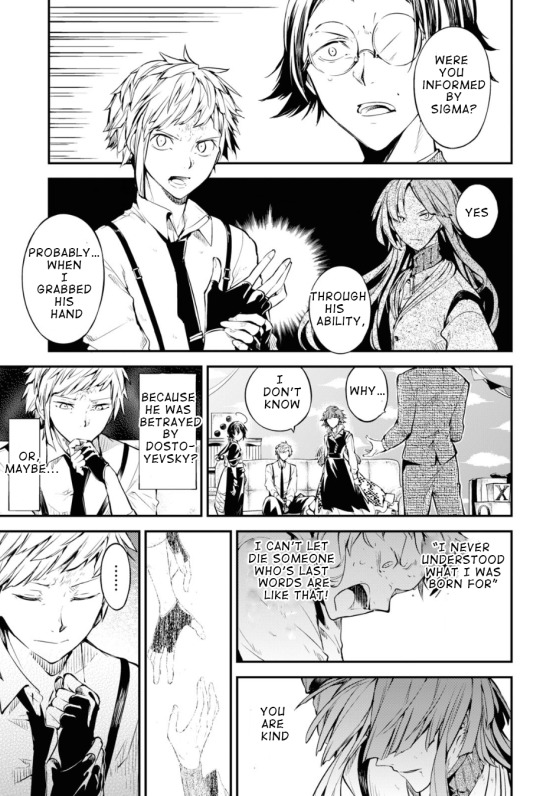
Sigma now knows, to an extent, that he matters. At least, he’s been told as much.
Gogol states that Sigma is key to his plans succeeding: Sigma’s ability can tell him Fyodor’s ability, which will enable Gogol to kill Fyodor. Except... Sigma’s ability might just work in an way that cultivates empathy post-connection with Atsushi. If Sigma can trust that he matters, despite having been created by the page and having been abused and subjected to all manner of lies and exploitation, he might be key to Fyodor and Gogol’s conflict resolution rather than to them actually killing each other.
Fyodor matters despite having an ability that seems to make him unable to touch people--because he can touch people with his empathy. (His empathy is, of course, literally what draws Gogol to want to kill him.) Fyodor’s empathy with Gogol has already physically saved Gogol.
Gogol matters even if he is understood by someone, because empathy is a strength and not a weakness. Someone understanding him doesn’t make him matter less, and being bound by feelings isn’t actually a bad thing. His connection with Fyodor has already saved his life.
Both Fyodor and Gogol have now saved Sigma at some point. Sigma’s design, of course, is literally split with two different colored halves of his hair, indicating that the artist likely means to symbolize the clash of two halves (see: Q, who represents how soukoku (Dazai and Chuuya) are two halves of a whole in terms of their best and worst traits). However, they exist in one person, and Sigma seems reasonably stable for someone with his situation.
Additionally, Fyodor and Gogol both are also somewhat modeled after Rodion Raskolnikov, the protagonist of Dostoyevsky’s Crime and Punishment, whose name literally means “split” in Russian. (Actually, Kirillov is very much a more internal, tragic version of Raskolnikov.) Like Kirillov, Raskolnikov is a paradox embodied: he’s stunningly empathetic and kind (rushing into a burning building to save orphans), but his philosophy is that it’s fine for him to kill others because he’s a “Napoleon” (special figure; “man-god,” to use Kirillov’s term).
But what is split is ultimately made whole in Crime and Punishment. Raskolnikov meditates on the raising of Lazarus from the dead and essentially resurrects himself, redeems himself.
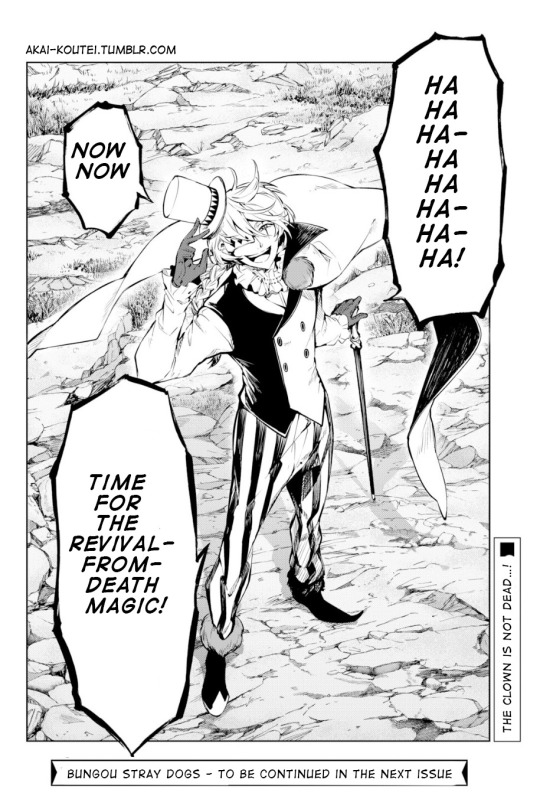
I highly doubt Gogol and Fyodor’s story will end with them dead because:
It’s BSD and nobody stays dead unless you’re Oda or a red shirt;
Gogol and Sigma have already served us fake-out deaths, so it’s a lot to ask your audience to buy another death from the same character (killing Fyodor is essentially Gogol killing himself);
them surviving and having Fitzgerald-esque redemption arcs very much fits with the themes of Dostoyevsky’s works and specifically with the book after which Fyodor’s ability is named;
resurrection seems to be a motif with everything involving Fyodor, from Cannibalism to this current arc.
#bsd meta#fyogol#bsd 79#bungou stray dogs meta#fyodor dostoyevsky#nikolai gogol#alexei kirillov#demons#nikolai stavrogin#bsd sigma#sigma#atsushi nakajima#bsd theory
405 notes
·
View notes